- Home
- Chuck Wendig
ZerOes
ZerOes Read online
Dedication
This book is for all the zeroes out there
Contents
Dedication
Chapter Ø: The Trans-Mongolian Railway
Part Øne: The SelectØr
Chapter 1: Chance Dalton
Chapter 2: DeAndre Mitchell
Chapter 3: Aleena Kattan
Chapter 4: Reagan Stolper
Chapter 5: Wade Earthman
Chapter 6: The Hook
Chapter 7: Hollis Copper
Chapter 8: The Compiler
Part TwØ: The LØdge
Chapter 9: Hackaway House
Chapter 10: The Babysat
Chapter 11: The Eye
Chapter 12: The Stolper Two-Step
Chapter 13: The First Message
Chapter 14: Evals
Chapter 15: Undertow
Chapter 16: The Compiler
Chapter 17: Paint It Black
Chapter 18: Pants on Fire
Chapter 19: Golathan
Part Three: The StØrm
Chapter 20: The Calm Before
Chapter 21: The Trap
Chapter 22: Tick-Tock
Chapter 23: Dark Water
Chapter 24: Breakout Capability
Chapter 25: Revenge Is a Dish Best Served at Dinner
Chapter 26: The Confessional
Chapter 27: The Thirteen
Chapter 28: The Call
Chapter 29: Today Is the Day
Chapter 30: The Nuclear Option
Chapter 31: Into the Woods
Chapter 32: Many-Headed Dragons
Chapter 33: The Fine Art of Bullshit
Chapter 34: An Earthman in Space
Chapter 35: Widow’s Walk
Chapter 36: Unlikely Allies
Chapter 37: Mouthful of Teeth
Chapter 38: Broken Mirror
Chapter 39: The Seven Seals
Part FØur: ErrØr CØrrectiØn
Chapter Ø: The Trans-Mongolian Railway
Chapter 40: The Descent
Chapter 41: Blood and Glass
Part Five: IntrusiØn
Chapter 42: Ghosts
Chapter 43: The Hunt
Chapter 44: Plugged Up
Chapter 45: Plugged In
Chapter 46: Death TV
Chapter 47: White Bison Country
Chapter 48: Number Fourteen
Part Six: Cascade
Chapter 49: Trolololol
Chapter 50: Project: Rabbitbrush
Chapter 51: The Increasing Illusion of Privacy
Chapter 52: The Great Divorce
Chapter 53: Mindhive
Chapter 54: Shooting Gallery
Chapter 55: Rage Virus
Chapter 56: The Response
Chapter 57: Metal and Blood
Chapter 58: Invasion of Privacy
Chapter 59: Panoptes
Chapter 60: Checkered Tablecloths
Chapter 61: Systems Diagnostics
Chapter 62: Paper Airplanes
Part Seven: CØllapse
Chapter 63: Snippets of Code
Chapter 64: The Trap for Rats and Roaches
Chapter 65: Problems, I Guess
Chapter 66: The Stirring Hive
Chapter 67: Troller Gonna Troll
Chapter 68: Midnight Chimes
Chapter 69: Trapped
Chapter 70: Towers of Dark, Rivers of Light
Chapter 71: This Is Not a Test
Chapter 72: Status Update: Lots of Boo-Boos
Chapter 73: The Great Below
Chapter 74: The Roof Is on Fire
Chapter 75: Off-Site Backup
Chapter 76: Six Months Later
Chapter Ø: The Trans-Mongolian Railway
Acknowledgments
About the Author
Also by Chuck Wendig
Credits
Copyright
About the Publisher
CHAPTER Ø
The Trans-Mongolian Railway
OUTSIDE ULAANBAATAR
The train clacks on the tracks, rocking side to side. A hundred smells come together—garlic in an iron wok, wet goat, a tin pail of piss—and nausea forms a rolling boil in Chance’s belly. He’s not sure the last time he had something to eat. But he has a water bottle within reach, the clear plastic red with steppe dust.
He takes a sip. His throat hurts like a scraped knee.
The three men across the table watch him drink. The water tastes sharply of minerals. He’s not sure where it came from—they probably filled it up from some spigot on the train. He hopes where the tourists sit. Not where everyone else sits. Or worse, where he saw that yak.
Chance tries to sniff, but his left nostril is blocked with dried blood.
“Do you need anything?” the translator asks. His mouth shows the faintest curl of a smile. His coal-black hair is shot through with veins of silver.
“Oh, now you’re being nice to me,” Chance says. His words come out a stuttering croak—the sound of a door creaking and juddering against its frame. The three Chinese men—the old cinder block with the caterpillar eyebrows, his attaché with the razor-sharp line of a mouth, and the translator—stare at him as if he’s got a third eye.
“We have questions,” the translator says. He’s not translating anything yet—the other two haven’t spoken aloud, not today. They chattered plenty when they pulled him out of Moscow, though the translator didn’t do much translating then, either. Mostly he explained what was about to happen. We are going on a journey. We are putting you on a train. You will not struggle or you will meet an unfortunate end. And so will your friends. Then he said the horrible magic words: We have Aleena Kattan.
So now here Chance sits. Feeling sick. And dizzy. And jumpy. Like a spark dancing at the end of a fraying wire.
The old man nods to the attaché, who whispers a string of Chinese to the translator. To Chance’s North Carolina ears, it doesn’t sound like much at all except a series of hissing murmurs.
The translator nods. “My friends want to tell you that you are not highly skilled and so they find it strange to be talking to you about this.”
“That’s not much of a question.”
“Please comment upon it.”
Panic is a nest of snakes inside his heart. He knows they want something from him, but he doesn’t know what. Two days ago they tried asking him questions and he didn’t understand and so they blackened both of his eyes and took a telescoping baton to his left knee and worked the rest of his torso over with fists before abandoning him here, in this room. Now they’re back and he still doesn’t know what they want.
“I don’t understand,” he says, drawing a deep breath past cracked lips. “I get beat up a lot, and my brain’s pretty rattled, so help me understand the question—”
The old man’s mouth tightens into a scowl.
The attaché backhands Chance.
His head rocks to the side. He tastes blood from his teeth biting the inside of his cheek. Spit or swallow? He opts to swallow, which only makes his queasiness surge.
The translator says with great enunciation, as if Chance is both American and stupid, “Your technical skills are not worthy.”
It occurs to Chance that the translator doesn’t translate any of his words to the other two men. They understand English. They just can’t—or won’t—speak it to him. “That’s probably true.”
“So why are we talking to you?”
Chance thinks he understands now. “You’re saying I’m a pretty subpar hacker. That’s probably right. So how am I here?” He winces and swallows more blood, tries to smile. “I was selected.”
“By your government.”
“If you say so.”
“By Typhon, then.”
His smile broadens. It is mirthless and re
d toothed. “If you say so.”
“How did you stop Typhon?”
Now Chance laughs. A ragged, raspy sound. “Who says we stopped it?”
PART ØNE
THE SELECTØR
CHAPTER 1
Chance Dalton
MIDLAND, NORTH CAROLINA
Chance is underneath his lemon-chiffon Plymouth Duster, trying—and failing—to fix an oil pan leak, when he hears the crunch of gravel under boots. He starts to slide out from under the car when someone says, “So it was you.”
Hands grab his heels, drag him the rest of the way out from under the car.
He looks up, sees three guys standing over him. Two are football players: Ryan Bogardian and Anferny Derkins. Quarterback and linebacker of the Yellowjackets, respectively. Ryan is built like a great white shark—long, lean, fast as thrown lightning. Derkins looks like the love child of a freight train and a bank safe.
The third guy’s older than the other two by a good stretch. Got a lot of gray in that bristly, unkempt mustache. Got a lot of rust on that socket wrench in his hand, too.
Well, shit. Chance wipes his hands on his shirt and starts to get up, but Ryan puts a boot on his chest and presses him down.
It’s the older man who speaks first. “You don’t look like a computer nerd.”
“I’m not,” Chance says. It’s not a lie. Not really.
Bam. A hard kick to his ribs from Anferny Derkins. Chance feels something give. The pain is like a rock through a window. He cries out, rolls over—
Hands hoist him to his feet. Slam him up against his Plymouth.
“I don’t know what y’all think I did—” Chance says, trying not to wheeze.
The old man pistons a fist into his midsection. Pain blooms. The guy comes up on him like stink on a skunk, presses the length of the socket wrench against Chance’s throat. Chance struggles, tries to catch his breath, feels blood gathering above his neck and in his cheeks like water in a balloon, and suddenly his brain is like a too-big fish in a too-little fish tank where kids keep slapping the glass. Boooom, booooom, boooooom. Don’t tap the glass, kids.
Derkins is laughing. Bogardian is just leering, chin out, tongue resting on his lower lip like a slug. His eyes are flinty, catching light but reflecting back only darkness. Darkness and spite and maybe a little hate, too.
Maybe a lot of hate.
Black dots like blobs of ink dip and swirl in the margins of Chance’s vision. His heartbeat is like a kick drum in his neck, his cheeks, behind his eyes.
The guy finally pulls the wrench away.
Chance gasps a painful intake of air.
“This your car?” the old man says. He begins to pace the length of the Plymouth as Derkins and Bogardian pull Chance away.
“Naw,” Chance says, and he hears the smart-ass comment about to come tumbling out of his fool head and he tries to catch it, but it slips its leash and bolts through the door. “That’s my little pony. Actually, she’s a unicorn. Her name is Princess Glitternuts, so be real nice to her—”
Pop! A fist crosses open air, slams into his eye like a Mack truck.
Now Bogardian’s smiling. The ex-quarterback reels back the fist, holds it next to his head like a trophy, gives it a sweet little kiss like he’s kissing a puppet.
“That was a good hit, boy,” the old man says, running his hands along the Plymouth, along paint the color of a dark forest. “You still got it, Ry.”
“Thanks, Dad,” Bogardian says.
Chance blinks, coughs, says, “Can I ask you something?”
Bogardian shares a look with his father.
“Who told you?” Chance asks.
“Who told us what?” Bogardian says, gaze gone slim.
“That I did what you think I did.”
The elder Bogardian pipes in with a laugh. “One of your fellow hacker buddies sent around an e-mail. Showed us who was the one sticking the broom handle up our ass.”
“I’m not a hacker,” Chance says. He’s not. He knows people. He knows how to figure them out, break them down, but he’s bush league. “I don’t have any hacker buddies.”
“No,” the father says, grinning wide. “I guess you don’t.”
The quarterback hits him again. Right in the breadbasket. Oof. Chance can’t help it. He doubles down.
“Lemme ask you another question.” He breaks into a coughing fit. “How’d it feel?”
“How’d what feel?”
“How’d it feel when you lost your scholarship, you rapist assho—”
His head rocks back with the force of another hit. His lip splits against his own teeth. Blood flows as Derkins flings him to the ground. Suddenly Bogardian is on top of him, fist rising and falling like a hammer slamming a post into dry earth. Chance cries out.
Not because of the pain. That’s bad. Hell, that’s awful.
He cries out because he sees what’s about to happen next.
Bogardian’s father raises the socket wrench.
And begins busting the windows of Chance’s one true love: his Plymouth Duster.
The double-wide trailer sits at the south end of the family’s old farm—a farm that’s gone to hell because Chance doesn’t know how to keep it up, the property overgrown with tall grass and poison ivy. There’s an old apple tree that’s so burdened by kudzu it’s taken the shape of an arthritic T. rex.
Chance shuffles past the old barn with a drunken lean and heads into the trailer, each lift of his foot up the cinder-block steps a certain agony. His ribs feel like someone stuck a knife between them. Once inside, he makes a beeline for the sink. He pushes aside some dirty dishes. Spits a line of blood against the white porcelain. Wiggles a back tooth with his tongue. Then licks his split lip.
Chance winces, stoops, washes up. The terrible thought runs laps through his head: If they know, who else knows? And just who the hell is out there telling people he did this? How does anybody even know?
If someone knows, then that means the authorities might know, too. That means the media might find out. And if he gets drawn into that, then what? He’ll get run out of town. And not before having his ass beat up and down the highway, too. Worst of all, Faceless will come after him. He did what he did using their name. Their cred. If his getting caught means unmasking the masked—well, they call themselves Faceless for a reason. They can do a lot more than beat him up. They can hack his life to little bits.
He just wants to keep to himself. The thing with the football team and their “rape posse,” well—he had to get involved. Had to. It was the right thing to do. (And a small voice reminds him, And you had a debt to repay, didn’t you?)
Now he’s got another, different kind of debt to repay.
Revenge for the Duster.
Chance heads over to the laptop. Loads up Facebook. Ignores all the memes and cat GIFs and people outraged about this, that, or the other thing and instead heads to the search window. He pulls up Ryan Bogardian’s account. Lots of folks standing by the football player. He sees one comment: I know you didn’t rape those girls, RB, but somebody ought to.
That gets Chance mad. But that’s not why he’s here. He looks to Ryan’s list of friends and family. Ryan’s old man isn’t on the list. He didn’t look like a Facebook user, though it surprises Chance just how many folks are on Facebook these days.
But Ryan’s mother is on it, though. Marylou Bogardian. That’ll do.
Chance looks at her account. Sees the e-mail address she’s got associated with it. Then he uses that to log in as her. If he had enough time he might be able to figure out her password—older folks don’t use nearly the amount of protection they should. Half the time it’s password123 or a cat’s name or something you could figure out by poking around their photo streams for ten minutes.
He doesn’t feel like wasting the time. He checks the box that tells Facebook that he—Marylou—has forgotten the password. It says she’ll get a new password via e-mail, but he clicks the box that says she doesn’t have access to
that e-mail address anymore. Then Facebook asks for a new address, and he puts in a dummy one he’s been using.
Here the site asks him a security question. What is your mother’s maiden name?
New browser window. He goes back and starts poking through Marylou’s profile. It’s pretty spare. Mostly passing around political stories that could be disproved by a cursory Snopes search. So Chance heads off to one of those ancestry sites.
There she is. She’s got an account. Got her family tree all pretty and public. Mother’s maiden name: Kiplinger.
Back to the Facebook window. He types it in. His phone dings. Chance snatches it off the desk and resets Marylou’s password to mysonisarapist. Then he uses the password to log in as her. His blood’s pumping, racing through his veins like a bullet ricocheting down a metal pipe, and he starts writing a new status for Marylou Bogardian. A status about her precious son, Ryan.
I would like to apologize for my son, Ryan. I know now that Ryan did those things to those poor girls and he is a rapist monster. I blame myself and I blame my husband, who was abusive to us and who cared only about beer and football and those magazines about having sex with horses. My son is a rapist. My husband is a wife-beater. May God have mercy on all our souls.
“I hope this shit goes viral like a case of monkey flu,” Chance says. He moves to click the Post button.
His monitor goes dark. All that’s left is a bright white pinprick.
“What the—”
The monitor clicks a few times. Click. Click-click. Clickclickclick. Then it comes back on.
The Facebook screen is gone. In the center of the screen sits a little pop-up window. Like from an old Windows 95 machine—bad resolution, blown-out pixels. It warps a little, the colors go funky.
The pop-up window reads: KNOCK-KNOCK.
Chance thinks, I’ve been hacked.
Then the monitor goes dark, and just as it does, the door to his trailer flies open—splintering at the already wobbly hinges, coming off as it swings wide.
Two men enter. Cops. SWAT. Feds, CIA, NSA, Chance doesn’t know who—but they’ve got helmets and shiny visors and black armor.
Chance doesn’t have time to figure out who they are or what they want. He’s up on his feet, his body complaining against the sudden movement. A gun goes off. The laptop spirals and shatters in a rain of black plastic.

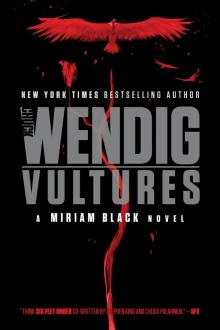 Vultures
Vultures Mockingbird
Mockingbird Wanderers
Wanderers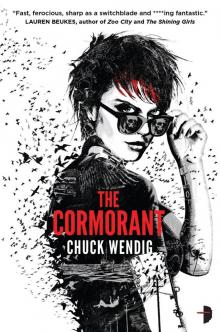 The Cormorant
The Cormorant Empire's End: Aftermath (Star Wars)
Empire's End: Aftermath (Star Wars)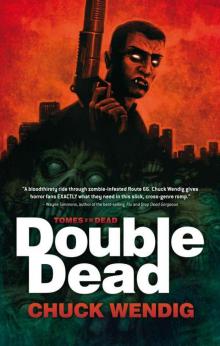 Double Dead
Double Dead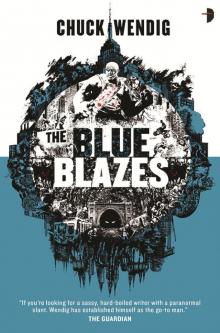 The Blue Blazes
The Blue Blazes 250 Things You Should Know About Writing
250 Things You Should Know About Writing Irregular Creatures
Irregular Creatures The Raptor & the Wren
The Raptor & the Wren Aftermath: Star Wars
Aftermath: Star Wars Blackbirds
Blackbirds The Hunt
The Hunt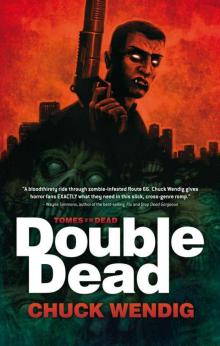 Tomes of the Dead (Book 1): Double Dead
Tomes of the Dead (Book 1): Double Dead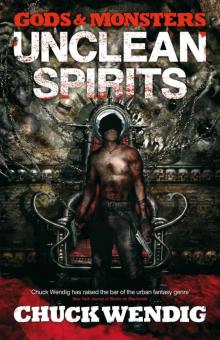 Gods and Monsters: Unclean Spirits
Gods and Monsters: Unclean Spirits The Harvest
The Harvest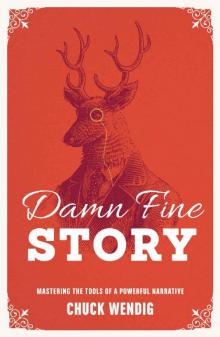 Damn Fine Story: Mastering the Tools of a Powerful Narrative
Damn Fine Story: Mastering the Tools of a Powerful Narrative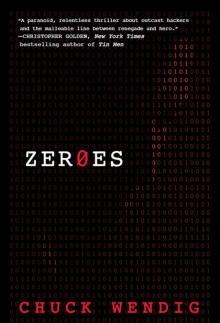 ZerOes
ZerOes Thunderbird
Thunderbird The Hellsblood Bride
The Hellsblood Bride Double Dead: Bad Blood
Double Dead: Bad Blood Life Debt
Life Debt